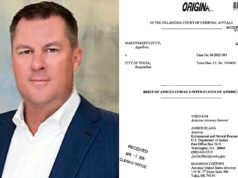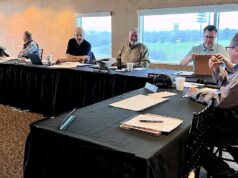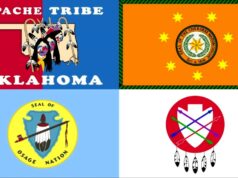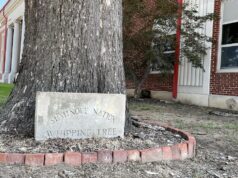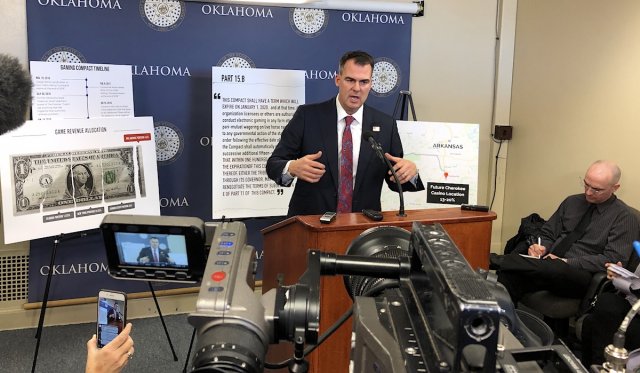
Attorneys representing Oklahoma Gov. Kevin Stitt filed their response today to a gaming lawsuit brought by the Cherokee, Chickasaw and Choctaw nations just before the first of the year. The tribes’ suit asks for the U.S. District Court for the Western District of Oklahoma to rule on a section of the state’s Model Tribal Gaming Compact that the tribes say has triggered its automatic renewal.
Stitt, a first-term governor and citizen of the Cherokee Nation, has argued otherwise. In an essay distributed Wednesday evening with his attorneys’ legal brief, Stitt described the battle’s background from his perspective:
When I came into office, I inherited letters from two Oklahoma tribes concerned that their Model Gaming Compact would expire on January 1, 2020. They explained that their compacts were “dated” and “unsuitable for the current and future business environment of gaming in Oklahoma” and asked that the State begin negotiating new gaming compacts. I took those letters seriously and consulted numerous legal experts to learn more. They all agreed the compacts expired on Jan. 1, 2020. Therefore, in July 2019, I invited all Oklahoma tribes to discuss new gaming compacts. Our goal was to update compact terms to be more responsive to market conditions and to better account for the State’s interests while protecting economic growth and development for our tribal partners. I still hold to that mission today.
Stitt attorneys seek five areas of relief
The response filed on behalf of Stitt (embedded below) rebuts claims made in the tribes’ suit and asks the court for five areas of relief:
- declare that the tribes’ compacts did not automatically renew Jan. 1;
- “declare that the tribes’ continued conduct of class III electronic gaming activities violates federal and state law”;
- “enter an injunction prohibiting the tribes from conducting class III electronic gaming unless and until new gaming compacts are negotiated and entered into”;
- create a “constructive trust upon class III electronic gaming revenue earned by the tribes from and after Jan. 1, 2020”;
- and award all fees and court costs incurred from the lawsuit to the state of Oklahoma
The state-tribal legal dispute largely focuses on Part 15 B of the gaming compact, which reads:
This Compact shall have a term which will expire on January 1, 2020, and at that time, if organization licensees or others are authorized to conduct electronic gaming in any form other than pari-mutuel wagering on live horse racing pursuant to any governmental action of the state or court order following the effective date of this Compact, the Compact shall automatically renew for successive additional fifteen-year terms; provided that, within one hundred eighty (180) days of the expiration of this Compact or any renewal thereof, either the tribe or the state, acting through its Governor, may request to renegotiate the terms of subsections A and E of Part 11 of this Compact.
Stitt’s legal response was filed by four attorneys with the Ryan Whaley law firm (Phillip Whaley, Dan Webber, Patrick Pearce and Matthew Kane), two attorneys from the Lytle, Soule & Felty law firm (Steve Mullins and Matthew Felty) and Stitt’s staff counsel, Mark Burget and Jeffrey Cartmell.
The brief does not feature attorneys from the Perkins Coie law firm that the Stitt administration said Jan. 3 it had engaged to help with the gaming compact issue. In distributing the legal brief, the administration announced the firm would no longer be representing the state.
Oklahoma Attorney General Mike Hunter is not listed on the filing either. For Oklahoma’s ongoing lawsuits against opioid manufacturers and distributors, Hunter has contracted with Michael Burrage, the longtime general counsel of the Choctaw Nation. Burrage was not listed on behalf of the Choctaw Nation in the three tribes’ suit against Stitt.
What’s the Horse Racing Commission got to do with it?
In their original gaming lawsuit, attorneys for the three tribes argued that the Oklahoma Horse Racing Commission’s past actions triggered the automatic renewal provision of the compact described above.
“The Oklahoma Horse Racing Commission authorizes ‘organization licensees’ to conduct electronic gaming. (…) The commission considers applications for and issues licenses authorizing such gaming pursuant to state statutes and its own rules and regulations,” the tribes’ attorneys wrote. “The commission did not promulgate its original Rules for Racetrack Gaming until after the compact went into effect, and those rules were subsequently approved by Oklahoma Gov. Brad Henry on April 6, 2005. Since then, the Commission has repeatedly amended these rules, most recently in 2013.”
Stitt’s attorneys disagreed in their response:
The tribes’ gaming compacts automatically renew only “if organization licensees or others are authorized to conduct electronic gaming in any form other than pari-mutuel wagering on live horse racing pursuant to any governmental action of the state or or (sic) court order following the effective date of this compact.”
The organization licensees that conducted electronic gaming on Jan. 1, 2020, were authorized to do so by Oklahoma voters pursuant to State Question 712 approving the act in 2004.
Neither the state nor a court has authorized organization licensees or others to “conduct electronic gaming in any form other than pari-mutuel wagering on live horse racing” following the effective date of any of the gaming compacts.
Tribal leaders have criticized Stitt for his position on the compacts.
“Gov. Stitt has made comments about ‘uncertainty that exists’ regarding Class III gaming after Jan. 1, threats to our casino vendors and their livelihoods and demands for redundant audits,” Cherokee Nation Principal Chief Chuck Hoskin Jr. said in a Dec. 31 press release. “We have little choice but to ask a federal judge to confirm the compact’s automatic renewal on Jan. 1.”
Stephen Greetham, general counsel for the Chickasaw Nation, released a statement Wednesday night.
“We are glad Gov. Stitt has not sought to delay the proceedings,” Greetham said. “We are reviewing the pleading his lawyers filed on his behalf and look forward to learning what legal basis he will claim to justify the uncertainty he has endeavored to create. Going forward, we look forward to working with the court and obtaining a final resolution.”
Read the Stitt administration’s response
 Loading...
Loading...
(Update: This post was updated at 11:15 p.m. Wednesday, Jan. 22, to include comment from Stephen Greetham. It was updated again at 8:30 p.m. Monday, Jan. 27, to clarify reference to Gov. Kevin Stitt’s Cherokee citizenship.)











